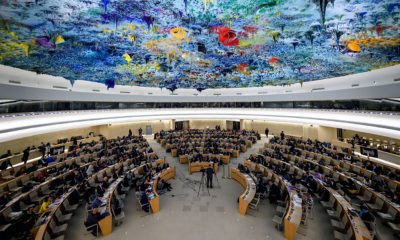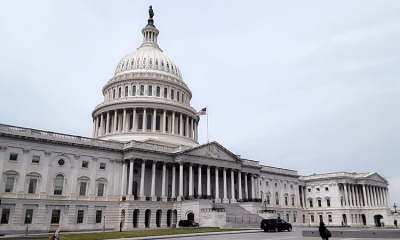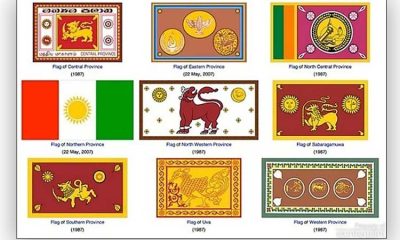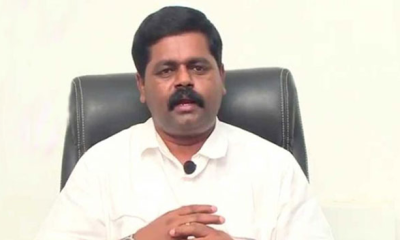News
Manohara makes strong case for draft Constitution, responds to criticism

By Shamindra Ferdinando
President’s Counsel Manohara de Silva has strongly defended the retaining of the controversial 13th Amendment introduced at the behest of India in the new draft Constitution formulated by a 9-member committee appointed by former President Gotabaya Rajapaksa.
Manohara, one of the members of the committee headed by Romesh de Silva, PC, emphasised that the controversial Amendment enacted in the wake of the Indo-Lanka Accord signed in July 1987 had been diluted by the draft Constitution therefore Provincial Council system no longer posed a threat to the country’s unitary status.
An outspoken critic of foreign intervention, Manohara said so at a symposium organized by the Buddhasasana Karyasadaka Mandalaya at Sri Lanka Foundation (SLF) recently.
The constitutional expert challenged those skeptical of the draft Constitution to prove the committee wrong. The lawyer appreciated the Buddhist grouping taking the lead in educating the public on the proposed Constitution in the absence of the Wickremesinghe-Rajapaksa government taking any interest in the ex-President’s project.
However, on behalf of the Coalition Against Partition of Sri Lanka, its Convener retired Lt. Gen. Jagath Dias sought an explanation from the committee regarding the representations made by the Tamil National Alliance (TNA), one-time LTTE ally, pertaining to new constitutional proposals.
The Gajaba Regiment veteran also asked whether the discourse on the draft Constitution initiated on Oct. 12 would continue and the availability of an opportunity to make suitable amendments having considered fresh views in that regard.
Lt. Gen. Dias, who has declared that the full implementation of the 13th Amendment would undermine Sri Lanka’s unitary status, stressed the need for wider consultations regarding constitutional amendments.
President’s Counsel Romesh de Silva declined to reveal the submissions made by the TNA delegation, led by its leader R. Sampanthan. De Silva received the backing of four members of his committee, namely Manohara de Silva, Sanjeewa Jayawardena, PC, Samantha Ratwatte, PC and Navin Marapana, PC.
The team leader said that the dialogue between them and the TNA or any other party couldn’t be discussed publicly though necessary amendments could be effected following discussions. The committee explained that their responsibility was to produce a draft Constitution and further actions should be the prerogative of the government in power. The committee acknowledged that since the handing over of the draft Constitution to the then President, nothing has been done. The gathering was told that based on further discussions on the subject matter the process could be advanced in consultation with relevant parties.
Manohara de Silva said that in the absence of the Gotabaya Rajapaksa government and the Wickremesinghe-Rajapaksa government sleeping on it, Buddhasasana Karyasadaka Mandalaya, invited them to educate the public of the initiative. “We are only invitees here. Perhaps, they’ll continue this process,” the top lawyer said.
Ven. Athureliye Rathana, MP, threw his weight behind the effort. The MP monk asserted that the draft Constitution cleverly proposed a way out of a sensitive issue as it involved India and couldn’t be dealt with haphazardly. The monk stressed the need to further improve the section that dealt with waste, corruption and irregularities and closer look at economic policies. The former JHU heavyweight pointed out how Sri Lanka handled the power sector without adhering to tender procedures, thereby causing enormous loss to the national economy.
In his speech, Manohara de Silva responded to criticism directed at their draft Constitution. Declaring that what had been proposed was not the 13th Amendment that was already in the Constitution now, the lawyer said that they opposed it because the Provincial Council exercised more powers than the government.
The crux of the matter is in case Provincial Councils enacted a law in terms of the current Constitution, the Parliament has no say. The 13th Amendment to the Constitution has been enacted at the expense of Parliament, Manohara said, adding that the Supreme Court that was sharply divided on the issue allowed the law to be passed on the basis the Parliament with a two-thirds majority could do away with it.
Therefore, the 13th Amendment diluted the power of Parliament, the lawyer said, declaring that draft Constitution proposed that though the Provincial Councils could enact laws relevant, Parliamentary laws wouldn’t be undermined by them. De Silva explained that the 13th Amendment compelled the Governors of the Provinces appointed by the President to work in consultation with the provincial ministers. Alleging it dented the executive authority pertaining to what he called provincial subjects, Manohara said that they proposed measures to be taken against in case Provincial Councils resorted to wrong executive decisions.
Perhaps one of the most significant proposals was to do away with elections to the Provincial Councils, the lawyer said, explaining how the required number of PC members could be elected at the Local Government polls, thereby saving quite a considerable amount of funds. Manohara de Silva stressed that what was proposed by them were not the PCs established under the current law.
“Some asked why the whole thing was not scrapped altogether. We discussed this matter. We could have formulated the draft constitution without the relevant section on Provincial Councils,” he said, referring to various constitution making attempts with the focus on the project undertaken by M.A. Sumanthiran, MP, and the then UNP National List Member Dr. Jayampathy Wickremaratne during the Yahapalana administration.
Warning the audience of the threat posed by President Ranil Wickremesinghe’s declaration that he intended to build on the Yahapalana constitutional project, De Silva said that political parties represented in Parliament, and outside, wanted the PC system to continue. Those who had appeared before the committee sought the continuation of the PCs as they wanted their offspring and henchmen to use them as launching pads for parliamentary careers. Therefore, the only option available was to dilute the PCs as the Parliament wouldn’t allow abolition of PCs, the lawmaker said, declaring no government would do so. An irate de Silva said that those represented in Parliament wanted the expansion and strengthening of the system.
Manohara said that members of the nine-member committee could have produced nine different drafts. But, they decided to sink whatever the differences to produce one document that took into consideration views expressed by political parties represented in Parliament and outside.
News
US sports envoys to Lanka to champion youth development

The U.S. Embassy in Colombo welcomed the U.S. Sports Envoys to Sri Lanka, former National Basketball Association (NBA) and Women’s National Basketball Association (WNBA) players Stephen Howard and Astou Ndiaye, from June 8 through 14.
The Public Diplomacy section of the U.S. Embassy said that it would launch a weeklong basketball program intended to harness the unifying power of sports, made possible through collaboration with Foundation of Goodness and IImpact Hoop Lab.
While in Sri Lanka, Howard and Ndiaye, both retired professional basketball players, will conduct a weeklong program, Hoops for Hope: Bridging Borders through Basketball. The Sports Envoys will lead basketball clinics and exhibition matches and engage in leadership sessions in Colombo and Southern Province for youth aged 14-18 from Northern, Uva, Eastern and Western Provinces, offering skills and leadership training both on and off the court. The U.S. Envoys will also share their expertise with the Sri Lanka Basketball Federation, national coaches, and players, furthering the development of basketball in the country. Beyond the clinics, they will collaborate with Sri Lankan schoolchildren to take part in a community service project in the Colombo area.
“We are so proud to welcome Stephen and Astou as our Sports Envoys to Sri Lanka, to build on the strong people-to-people connections between the United States and Sri Lanka,” said U.S. Ambassador Julie Chung. “The lessons that will be shared by our Sports Envoys – communication, teamwork, resilience, inclusion, and conflict resolution – are essential for leadership development, community building, equality, and peace. The U.S. Sports Envoy program is a testament to our belief that sports can be a powerful tool in promoting peace and unity.”
News
Rahuman questions sudden cancellation of leave of CEB employees

SJB Colombo District MP Mujibur Rahuman in parliament demanded to know from the government the reasons for CEB suspending the leave of all its employees until further notice from Thursday.
MP Rahuman said that the CEB has got an acting General Manager anew and the latter yesterday morning issued a circular suspending leave of all CEB employees with immediate effect until further notice.
“We demand that Minister Kanchana Wijesekera should explain this to the House. This circular was issued while this debate on the new Electricity Amendment Bill was pending. There are many who oppose this Bill. The Minister must tell parliament the reason for the urge to cancel the leave of CEB employees,” the MP said.However, Speaker Mahinda Yapa Abeywardena prevented Minister Wijesekera responding to the query and said that the matter raised by MP Rahuman was not relevant.
News
CIPM successfully concludes 8th Annual Symposium

The Chartered Institute of Personnel Management (CIPM) successfully concluded the 8th Annual CIPM Symposium, which took place on 31st May 2024. Themed “Nurturing the Human Element—Redefining HRM in a Rapidly Changing World,” the symposium underscored the pivotal role of human resource management (HRM) in today’s dynamic global landscape. Since its inception in 1959, CIPM has been dedicated to advancing the HR profession through education, professional development, and advocacy, solidifying its position as Sri Lanka’s leading professional body for HRM.
Ken Vijayakumar, the President of the CIPM, graced the occasion as the chief guest. The symposium commenced with the welcome address by the Chairperson, Prof. Arosha Adikaram, followed by the Web Launch of the Symposium Proceedings and Abstract Book by the CIPM President. The event featured distinguished addresses, including a speech by Chief Guest Ken Vijayakumar, President of CIPM, and an address by Guest of Honor Shakthi Ranatunga, Chief Operating Officer of MAS Holdings Pvt. Ltd., Sri Lanka.
The symposium also featured an inspiring keynote address by Prof. Mario Fernando, Professor of Management and Director of the Centre for Cross Cultural Management (CCCM) at the University of Wollongong, Australia.
Vote of Thanks of the inauguration session was delivered by Dr. Dillanjani Weeratunga, Symposium Co-chair.
The symposium served as a comprehensive platform for researchers to present their findings across a wide range of critical topics in HRM. These included Cultural Diversity and Inclusion, Talent Development and Retention, Ethical Leadership and Corporate Social Responsibility, Adapting to Technological Advancements, Mental Health and Well-being at Work, Global Workforce Challenges, Employee Empowerment, and Reskilling and Upskilling.
The plenary session was led by Prof. Wasantha Rajapakse. Certificates were awarded to the best paper presenters during the valedictory session, followed by a vote of thanks delivered by Kamani Perera, Manager of Research and Development.
The annual symposium of CIPM was a truly inclusive event, attracting a diverse audience that spanned undergraduates, graduates, working professionals, research scholars and lecturers. This widespread interest highlights the symposium’s significance in the field of HRM, offering a unique opportunity for everyone to network and learn from scholarly brains.The CIPM International Research Symposium was sponsored by Hambantota International Port, Sri Lanka Institute of Information Technology (SLIIT), E B Creasy & Co. PLC, and Print Xcel Company.
























